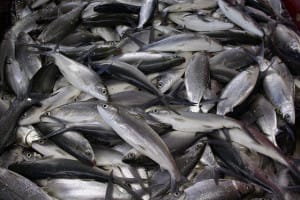The Guardian
by Tom Levitt
 |
US food company Cargill wants to use expertise from the farmed salmon sector to help it produce more efficient and sustainable fish and chicken
It is difficult to know which is moving faster: the debate around the ethics of farmed fish, or the growth in how much of it we are eating. By 2030, aquaculture is predicted to account for 60% of fish destined for our plates and it’s already more than half.
Its rapid growth has led some to predict its success in producing cheaper fish could rub off on the meat sector, giving us a more efficient, but not necessarily more ethical, form of protein.
Farmed fish have in the past been seen as the saviour of overfishing. The more we could produce in caged farms and ponds, the theory went, the fewer we would need from the sea. Then we found out that most of the wild fish being caught were being used to feed the fish in the cages, and the benefits suddenly seemed a lot less clear.
Fish feed companies have reacted to the criticism by developing more land-based alternatives to marine feed and, as people get worried about palm oil and soy, by looking to algae, seaweed and even insects.
Given that feed has always been the biggest cost for fish producers, the sector has focused on creating less wasteful, more sustainable feed. In the salmon sector, where feed accounts for 60% of costs, the feed conversion rate (the amount of feed needed to produce a given amount of fish meat) has shrunk, with 1kg of fish taking 1.4kg of feed to produce.
Just a decade ago WWF was lamenting the large numbers of wild fish being fed to caged farm fish: “Four kgs of wild-caught fish are needed to produce 1kg of farmed fish,” it said.
Today WWF aquaculture expert Piers Hart says salmon farming has the “most efficient animal feed in the world”. In fact, since fish only makes up a proportion of the feed given to salmon, along with vegetable meal and oils, many farms are reported to be using 1kg or less of wild fish for each kg of salmon produced.
Imagine how much the cost of beef could fall if it could match such progress. It currently takes around 10kg of feed to produce just 1kg of beef.
From fish to chicken
It is this technological advance that is likely to have spurred Cargill – one of the world’s largest food companies – to spend £1bn buying up the Norwegian salmon-feed supplier Ewos. If it can use some of Ewos’ knowhow in its livestock business, so the thinking goes, it could save millions of dollars in feed and production costs. Ewos has nearly halved the quantity of marine ingredients used in feed in the past decade, according to Cargill.
Hart believes the real interest for Cargill is in the expertise it gains in making feed more efficient, rather than being a big player in the salmon sector. “I don’t think it is seeing much growth in salmon, where expansion and production costs are high. It wants to transfer the technology to other sectors, such as tilapia and its poultry business.”
Tilapia, along with carp and catfish, is expected to see the biggest growth over the next 15 years, according to the UN Food and Agricultural Organization (FAO). Global tilapia production is predicted to almost double between 2010 and 2030, driven by growth in south-east Asia, in part because of its ease of production compared with salmon and other carnivorous fish such as trout.
But for Cargill, the benefits for its poultry interests could be just as big. The switch away from marine-based feed means fish and poultry feed are now very similar, says Hart. And along with fish, the poultry sector is set to account for the vast majority of the growth in animal protein over the next decade, with chicken predicted to surge past pork as the world’s most popular meat by 2020.
Sustainable, but not ethical
So will the transfer of expertise from salmon farms to the rest of the fish and livestock sector mean more sustainable protein for consumers?
Only if companies are pushed or incentivised to make improvements, suggests Hart. With such high feed costs, the salmon sector has a long history of pressure to be as efficient as possible. Its shift away from marine-based feed happened in part for economic reasons, adds Hart, with the sector heavily dependent on Peruvian anchovies, which have been hit by supply and cost issues.
In Europe in particular, there has been pressure to improve the environmental impact of salmon farms. NGO criticism of water pollution, for example, has helped drive better feed efficiency. “The more efficient the feed, the less that is wasted as effluent,” says Hart. And public concerns about palm oil and deforestation prompted Ewos to pledge to remove palm oil products from its fish feed last year, although Cargill has not indicated whether it would honour this commitment.
The farm fish sector also has a growing certification scheme, the Aquaculture Stewardship Council (ASC), set up in 2010, signing up producers to minimum sustainability standards.
Of course, as critics have pointed out, the focus on efficiency and feed is a very narrow definition of sustainability. It ignores the ethics of rearing caged fish or chickens and issues such as stocking densities, use of chemicals or antibiotics, husbandry and disease control. The results may be a more sustainable meat for consumers, but not necessarily a more ethical one.
For Hart, however, the benefits cannot be ignored. “We’re heading towards a crisis and because of the type of livestock production we are doing at present, food is one of the biggest problem areas. It’s mostly to do with feed, so anything that helps us use less feed is important,” he says.

